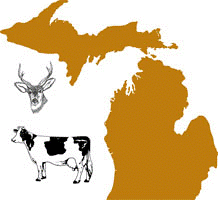Wildlife Disease and Zoonotics

Michigan Bovine Tuberculosis Bibliography and Database
Date of this Version
2008
Abstract
Numerous species of mammals are susceptible to Mycobacterium bovis, the causative agent of bovine tuberculosis (TB). Several wildlife hosts have emerged as reservoirs of M. bovis infection for domestic livestock in different countries. In the present study, blood samples were collected from Eurasian badgers (n = 1532), white-tailed deer (n = 463), brushtail possums (n = 129), and wild boar (n = 177) for evaluation of antibody responses to M. bovis infection by a lateral-flow rapid test (RT) and multiantigen print immunoassay (MAPIA). Magnitude of the antibody responses and antigen recognition patterns varied among the animals as determined by MAPIA; however, MPB83 was the most commonly recognized antigen for each host studied. Other seroreactive antigens included ESAT-6, CFP10, and MPB70. The agreement of the RT with culture results varied from 74% for possums to 81% for badgers to 90% for wild boar to 97% for white-tailed deer. Small numbers of wild boar and deer exposed to M. avium infection or paratuberculosis, respectively, did not cross-react in the RT, supporting the high specificity of the assay. In deer, whole blood samples reacted similarly to corresponding serum specimens (97% concordance), demonstrating the potential for field application. As previously demonstrated for badgers and deer, antibody responses to M. bovis infection in wild boar were positively associated with advanced disease. Together, these findings suggest that a rapid TB assay such as the RT may provide a useful screening tool for certain wildlife species that may be implicated in the maintenance and transmission of M. bovis infection to domestic livestock.


Comments
Published in Veterinary Microbiology 132 (2008) 283–292.